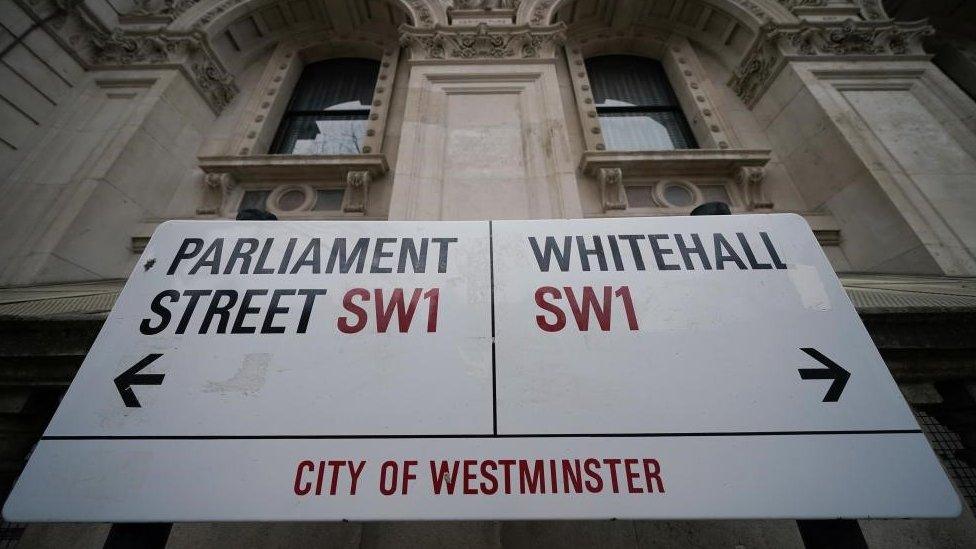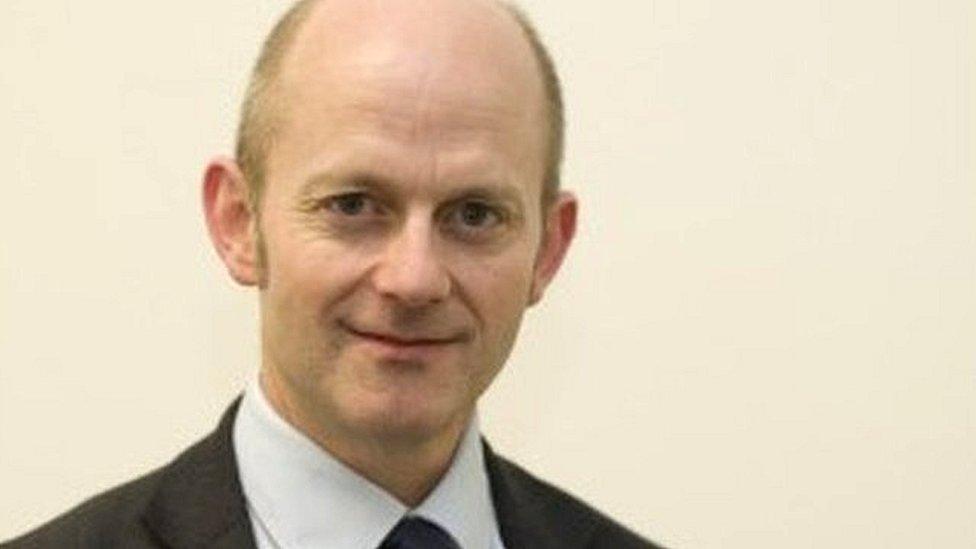Chris Mason: Civil service is poor, pompous and arrogant, say two former bosses
- Published

The people at the top of the civil service haven't got any idea how poor it is. Too many civil servants are too similar. The way the civil service defines "clever" is a mistake.
So say two men who each used to run a central government department.
Most of the time when I am writing for you here, I'm bringing you what I pick up from talking to leaders and cabinet ministers, backbenchers and political advisers.
But beyond them lies the engine room of any government, the civil service.
They are the ones with the job of making things happen, the things the prime minister and their ministers want to happen and Parliament has voted for.
The opportunities to understand how this works, or doesn't, are limited: civil servants are not public figures, it is their job to be impartial, and it is ministers who are rightly scrutinised.
But when there is a chance to do this, on your behalf, I'll do my best.
So I went along to a gathering organised by the Reform think tank to listen to a discussion involving serving civil servants, and addressed by two former senior civil servants, external - permanent secretaries in the jargon, the most senior civil servant in a government department.
They have spoken publicly before. But on this occasion they were both brutally direct.
Philip Rycroft used to be permanent secretary at the Department for Exiting the European Union, while Jonathan Slater used to be chief at the Department of Education, until he was sacked after a row about exam results.
They each painted a picture of a system they claimed to be dysfunctional despite the best efforts of very capable staff.
A system arrogant about its pedigree, pompous in its outlook, homogenous in its make up.
Too many people within it, Jonathan Slater argues, have "never done anything else, been told it is the Rolls Royce civil service, 'It's the best in the world'.
"Then you get to the top of it and think: 'Well, it can't be that bad can it?'
"You get to the top of the profession, you're not going to think it's poor at choosing the people who run it, are you?"
Philip Rycroft adds: "You can feel, as you walk down those corridors, you can feel oozing out of the stones the history of the place, that prioritising of the external. Punching above our weight in the world, being a big player, the tilt to the Pacific, all that stuff is still too dominant.
"I would sit round the table and bang on about Scotland. To, broadly speaking, disinterest around the table. Our ambassador to Beijing would come in and everyone would sit up and be absolutely fascinated. The priorities, the mental maps have just tilted in the wrong way."
He adds: "It is worth repeating endlessly: there are many thousands of hard working, dedicated civil servants who are good, hard working people, who should be respected. The system in which they are now operating is not giving them the opportunities they should have."
There is, though, he says, a "homogeneity of thought", because too many civil servants "live in the same parts" of London, and their "kids are in the same schools".

Philip Rycroft was promoted to head the Brexit department
In response, a government spokesman acknowledges to me: "It is vital that we have a workforce that reflects the talent that exists right across the UK.
"That is why all senior Civil Service vacancies are now required to be advertised externally and 22,000 Civil Service roles will be relocated out of London," the spokesman adds.
But Mr Slater goes further; the problems as he sees them in the civil service are symptomatic of an issue in wider society.
It is, he suggests, "a broader point about the way England - and it is England, not Scotland - defines clever. A particular sort of clever. A particular sort of academic excellence. I do think this is significantly related to the lack of productivity in our country."
A source close to a senior minister texts to take issue with this - suggesting it is more a civil service problem than a national one, and one minsters are alive to and responding too, by basing more civil servants outside the capital.
But it's not just geography but short sightedness too, Mr Rycroft claims.
He says: "I can't recall a moment where permanent secretaries stopped to think about politics beyond the next election. Where is the politics of this country going? Where are the people at? I think that is extraordinary."
The hoarding of power in London, he concludes, then makes things worse:
"England has the most centralised polity pretty much in the democratic world. And look at the consequences of that. Regional inequalities. Just travel. Just go to places. Go up north. Go to the towns and cities this country has left behind. We have been trying to fix this for years. And we have failed comprehensively. Isn't it about time we tried something else? Part of the answer has to be proper devolution."
Are these the grumblings of old timers, settling scores?
Privately, there are many serving civil servants who share many of these criticisms.
The government spokesman concludes: "We have already seen a rise in representation from a variety of backgrounds, but we are not complacent and continue to work to attract people from across society into public service."